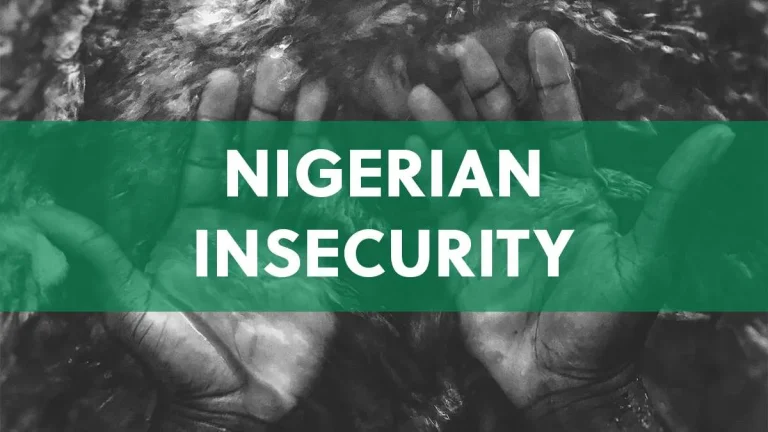Public conversations about insecurity in Nigeria almost always collapse into one familiar argument: religion. From claims of an “Islamic agenda” to talk of “Christian persecution” or “Fulani jihad,” the narrative is often reduced to faith — a simple, emotional explanation for a complex national tragedy.
But these labels, though loud and deeply internalised, miss the real story. Worse still, they are tearing apart communities that have lived side by side, shared food, and raised families together for generations.
The uncomfortable truth is this: Nigeria’s insecurity is not a religious war. It is a criminal economy — organised, protected, and sustained by powerful interests who profit from disorder. The masterminds are not hiding in the forests with bandits. They move freely in offices, political circles, and business networks where accountability seems to elude them.
The hidden economy behind the violence
In 2022, the Nigerian Financial Intelligence Unit (NFIU) traced 96 individuals and entities directly linked to the financing of Boko Haram and ISWAP. These findings were based on verified intelligence, cross-border tracking, and suspicious financial transactions — not rumours.
Yet, years later, Nigerians still have no answers.
Who are these people?
Why has the list never been published?
Why is nobody facing trial?
This silence is not by accident. It is political — a reflection of how deeply insecurity is tied to corruption, vested interests, and shadow networks that thrive when the truth is buried.
Research on extremist groups consistently shows one thing: terrorism is a business.
Kidnapping, illegal taxation, cattle rustling, smuggling, extortion, and illicit mining are not sporadic acts of violence — they are organised streams of revenue.
The Northwest: A criminal enterprise disguised as banditry
What many Nigerians casually refer to as “banditry” is actually the violent arm of a thriving illegal gold economy.
Armed groups tax miners, control pits, and trade raw gold directly for sophisticated weapons.
International buyers — especially from some Gulf and North African markets — help launder these conflict minerals into global value chains.
Behind every so-called “bandit group” are financiers with capital, political protection, logistics support, and cross-border links.
These men are not religious warriors. They are businessmen in crime.
The danger in blaming religion
Rather than demand accountability from the real sponsors of violence, Nigerians are too often pushed into blaming one another.
But these generalisations are not only false — they are dangerous.
Our communities remain deeply interconnected:
Christian–Muslim marriages, friendships, neighbourhoods, and shared struggles form the social fabric of everyday life.
As I have said many times, “Many of us have Christian relatives, in-laws, and friends — myself included. We share meals, challenges, and hopes for the same Nigeria.”
The Qur’an cautions: “Do not let the hatred of a people cause you to swerve from justice.” (5:8)
The Bible advises: “Judge with right judgment.” (John 7:24)
Both faiths condemn injustice. Both condemn violence.
Extremists do not represent Islam.
Criminals do not represent Christianity.
Terrorists do not represent any tribe.
When Nigerians generalise, they fall into the exact trap the criminals set: division.
And division is the shield that protects the real sponsors of insecurity.
Why unity matters now more than ever
When citizens turn on each other, the true beneficiaries of violence become invisible.
To break this cycle, Nigeria must:
- Publish the list of identified terrorism financiers.
- Audit and track every naira spent on security.
- Regulate and secure the gold supply chain.
- Disrupt arms-smuggling routes across the Sahel.
- Investigate elites benefiting from illegal mining and ransom economies.
But beyond policy, we must repair the social bonds that once made division difficult.
There was a time, not long ago, when Christian families gifted rice to Muslim neighbours during Salah, and Muslims visited Christian homes during Christmas.
These gestures were small, but they were powerful. They made it difficult for anyone to weaponise our differences.
We need that brand of Nigeria again.
The real battle ahead
Nigeria’s insecurity is not about religion.
It is a battle against:
- corruption,
- greed,
- exploitation,
- criminal resource networks,
- institutional failure.
It is a fight against those who turn human suffering into profit.
If we continue arguing over religion instead of confronting the criminal economy, we will keep chasing shadows in the forest while the real operators walk freely in Abuja, Lagos, Kaduna, Dubai — and beyond.
A call for collective resolve
Nigeria will overcome insecurity only when citizens refuse to be manipulated.
Peace grows in unity.
Violence grows in suspicion.
The task before us is simple but urgent: stand together as Nigerians — Muslims, Christians, and traditional believers — and demand transparency, justice, and accountability.
Only then can we unmask the true sponsors of violence and reclaim our nation’s future.
El-Kurebe Jnr is a Public Affairs Commentator from Shiroro, Niger State.


